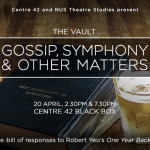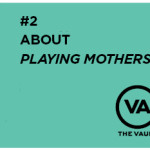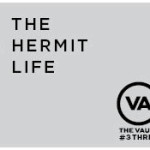Synopsis
One Year Back Home is the second play in Robert Yeo’s The Singapore Trilogy. Set in 1972, returning characters Hua and her brother Chye, and their mutual friend Fernandez, are back in Singapore after completing their studies in London.
Hua is a single mother to a five-year-old daughter who was conceived during the events of the first play. She begins dating Gerald, but chooses to keep her daughter a secret from him.
Chye and Fernandez become political opponents, the former contesting in the election as a member of the ruling Political Action Party, and the latter, in the opposition Workers’ Party. The play concludes with Chye elected into Parliament and Fernandez arrested for making inflammatory statements at a rally.
First Staging
Buoyed by the immense success of Are You There, Singapore? in 1974 , Yeo wrote the sequel One Year Back Home in 1979. But he had difficulty in finding willing parties to stage his script.
Yeo told the Straits Times‘s John De Souza in 1980 that one producer was “scared” to stage One Year Back Home, fearing retaliation over the play’s political content. Local writing was also much derided at the time – an industry peer allegedly told Yeo, “Why write new plays when there are so many good ones already written?”
Yeo eventually turned to Max Le Blond to produce and direct One Year Back Home under the aegis of the University of Singapore Society, the group that also staged Are You There, Singapore?
But there was another snag in bringing One Year Back Home to the stage. In July 1979, Yeo wrote to the Ministry of Culture to obtain a permit to perform the play in September that year. One month later, his request for the permit was rejected. It was only in May 1980, after more letters, phone calls, interviews and revisions to the script, that the Ministry of Culture permitted One Year Back Home to be performed. (Yeo recounts the 18-month journey to obtain the permit in the preface of the published script.)
One Year Back Home was finally performed from 20 to 22 November 1980 at the DBS Auditorium. (The play would receive one more staging in 1990 in TheatreWorks’ festival of Singapore theatre history The Retrospective.)
Responses
Local audiences thronged the auditorium eager to see the follow-up to Yeo’s Are You There, Singapore?. Theatre critics of the time, however, were divided over their evaluation of the sequel.
Margaret Chan, writing for New Nation, was emphatic in her praise of the production: “Last night I had the closest encounter with good Singapore theatre, and it was thrilling.” She called Le Blond’s direction “artistically and technically tight” and remarked that the Singaporean-ness of Yeo’s text made the experience “living theatre”.
Wong Hsien Cheen, also reviewing for New Nation, and Goh Kian Chee for the Straits Times, were in agreement that Yeo’s text was ponderous and heavy-handed. Wong wrote, “What emerged was a hotchpotch of sterile views which reduced Fernandez and Chye to caricatures… What is evident is that Mr Yeo must find some way of unburdening it of the heavy rhetoric which mucks up the whole thing.”
In addition, both Chan and Wong noted that the production was drawing laughter from the audience for its portrayal of Singaporean colloquialisms. The lighter moments though, were to the detriment of the production’s more serious scenes. Wong recounted, “At some point in the evening, the humour probably became too infectious, and the final scene when the Internal Security men came to arrest Fernandez was not greeted by the hushed unease of violated human liberties, but unbridled laughter! I suspect that, quite inadvertently, Robert Yeo has written a successful political comedy.”
Goh neatly summed up his experience of One Year Back Home: “Overall, I would not hesitate to recommend One Year to those seriously interested in the development of drama in Singapore. It is not a great play, but it is interesting enough for an evening out.”
Significance
Despite mixed reviews of its debut production, One Year Back Home would become an important entry in the Singapore dramatic canon.
Yeo appears as a sort of maverick for portraying local politics so vividly in One Year Back Home, especially when the sequel was written just a few years after eminent dramatist Kuo Pao Kun was arrested for alleged communist sentiments in his works. Yeo was quoted as saying, “[M]y play is a breakthrough because I’m taking on sensitive material, but I’m doing it from the point of view of an artist and I’m using the medium of a play to say these things.”
Even before the premiere of One Year Back Home, news media reporting on the production picked up on the political content of Yeo’s play. In a preview of the play published in New Nation a month before the production, Chan wrote, “The play, meant to be a social commentary, turned out to be political… Topical issues are aired in the battle [between Chye and Fernandez] such as the need for an opposition for its own sake in a democracy, blatant materialism breeding greed and tragic loss, the chit fund crash of that time and the need to conform.”
One Year Back Home and the rest of the Singapore Trilogy are also noted for their realistic portrayal of Singaporeans and Singapore society. In the infancy of the Singapore theatre landscape, it was Yeo’s belief that writers and practitioners should first focus on rendering Singaporean-ness as closely as possible in text and on stage. “What I’m trying to do is to reflect, to mirror reality,” Yeo said in an interview in 1980. “Now is the time, I feel, to start writing about the things around us… not symbolically or metaphorically, but realistically.”
Academics K.K. Seet and Chitra Sankaran historically situate the social realism of Yeo’s plays in their introduction to the Singapore Trilogy: “Yeo’s political dramas of the 1970s and early 1980s can be regarded as trailblazers, ushering in succeeding decades when Kuo Pao Kun would resort to allegory to question the status quo or Tan Tarn How would infringe on taboo areas and confront conservative political sensibilities through the veil of satire.”
One Year Back Home would also be heralded as one of the earliest examples of successfully representing the local patois on the page. In particular, Hua and Chye’s mother, Mrs Ang, is highlighted for her naturalistic speech in the play. Yeo had found a way to portray how a non-English educated Singaporean might speak English in a manner that felt more authentic and acceptable than attempts by forebearers like Goh Poh Seng and Lim Chor Pee.
According to Seet and Sankaran, Mrs Ang’s language features “a range of linguistic registers [extending] from Standard Singapore English to different forms of colloquial Singapore English […] including rich code-mixing and code-switching”.
Examining the significance of One Year Back Home against the backdrop of Singapore English-language theatre history, academic Robin Loon observed that the play and its box office success in 1980 was an indication that “there [was] an audience for locally-written English language plays [and that] the dramatist and playwright’s voice was also growing and beginning to engage with immediate social and political issues.”
By Daniel Teo
Published on 16 April 2019
One Year Back Home can be found in:
Yeo, R. (1990). One Year Back Home: A play in five scenes. Singapore: Solidarity Foundation.
Yeo, R. (2001). The Singapore Trilogy. Singapore: Landmark Books.
Other Sources:
Chan, M. (1980, October 10). From concern in the wings to centre stage. In New Nation. Downloaded from NewspaperSG.
Chan, M. (1980, November 21). Local idiom brings play to life. In New Nation. Downloaded from NewspaperSG.
De Souza, J. (1980, November 20). A playwright’s reality. In Straits Times. Downloaded from NewspaperSG.
Goh, K. C. (1980, November 21). Not great, but… In Straits Times. Downloaded from NewspaperSG.
Loon, R. (2016). Singapore English Theatre: Dynamic and diverse. In Singapore Chronicles: Theatre (pp. 17-41). Singapore: Institute of Policy Studies & Straits Times Press.
Wong, H. C. (1980, November 23). A success as political comedy. In New Nation. Downloaded from NewspaperSG.
.
The Vault: Gossip, Symphony & Other Matters features three performance responses to Robert Yeo’s One Year Back Home. The three performance responses are created by the graduating students of the NUS Theatre Studies Theatre Lab, engaging with and responding to the ideas, dramaturgy and theatricalities in One Year Back Home. Gossip, Symphony & Other Matters is presented by Centre 42 and NUS Theatre Studies. Find our more here.






